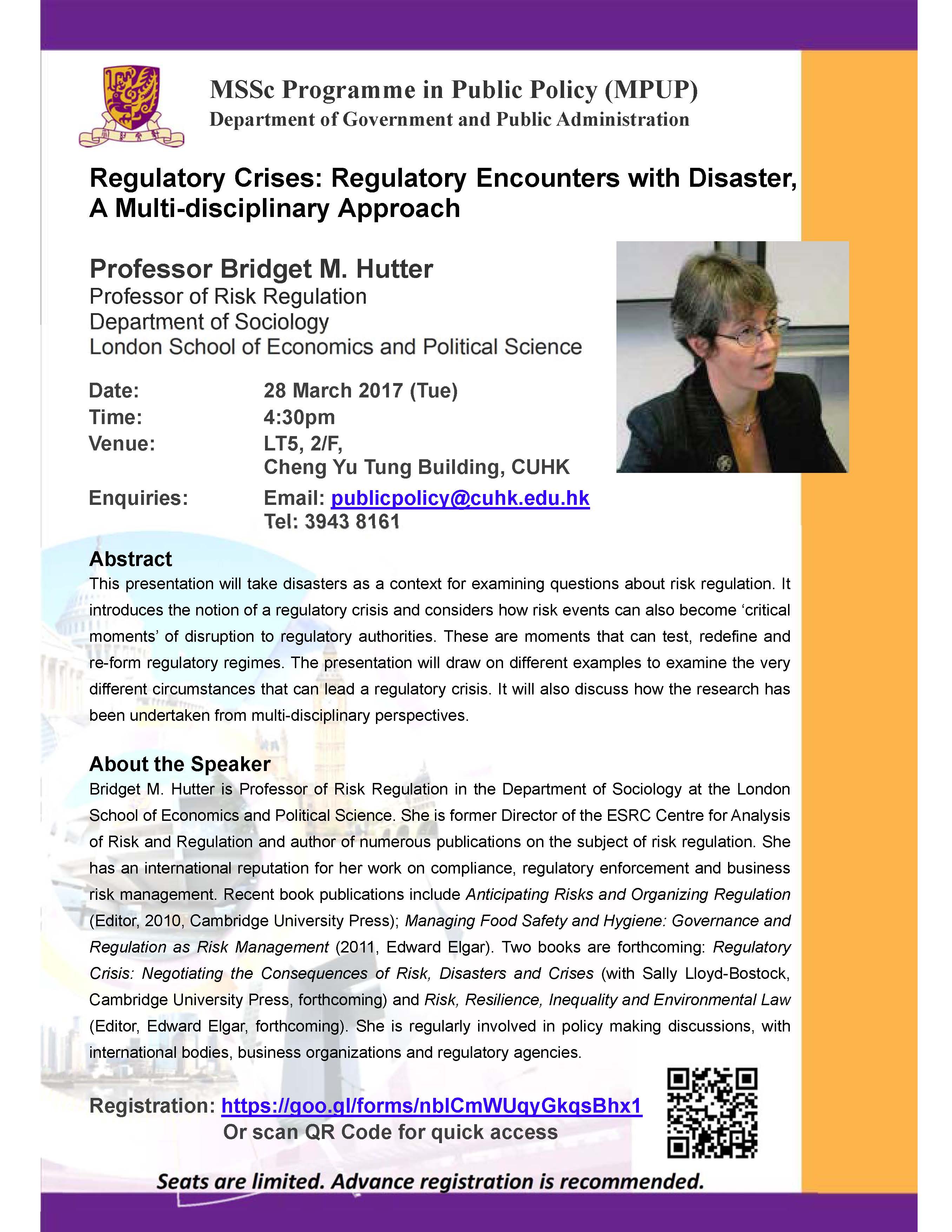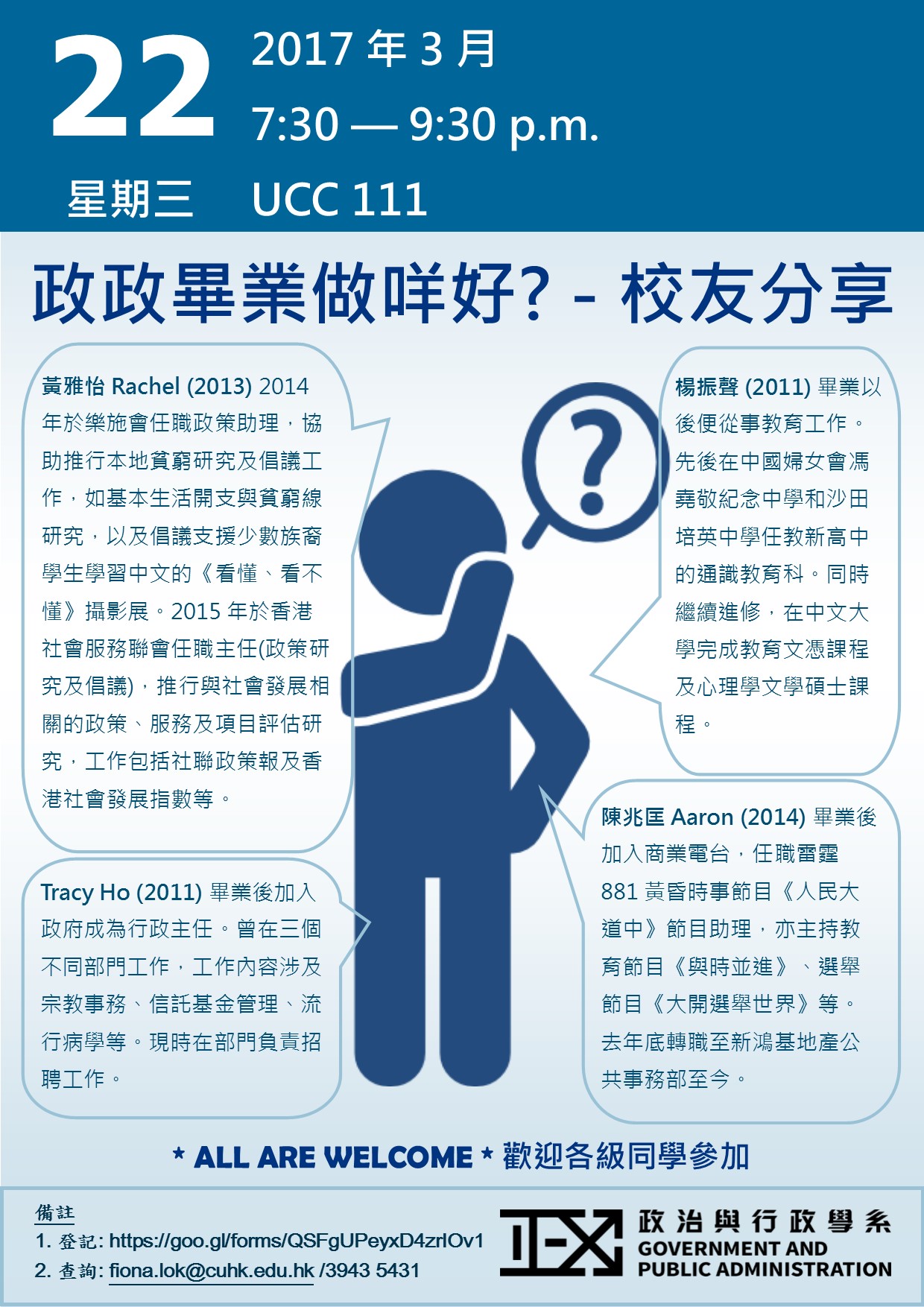- Home
- About
- Research
- Admission
- Programmes
- Courses
- People
- Student Life
- News
- GPA 50th Anniversary Celebration
- Alumni Sharing
Developed in conjunction with Ext-Joom.com

MPUP, MSSc Programme in Public Policy, has invited Professor Bridget Hutter, Professor of Risk Regulation from Department of Sociology, London School of Economics and Political Science, to visit CUHK in late-March. Prof. Hutter has an international reputation for her work on compliance, regulatory enforcement and business risk management.
Event details are as follows:
(A) Seminar: Regulatory Crises: Regulatory Encounters with Disaster, A Multi-disciplinary Approach
Date: 28 March 2017 (Tue)
Time: 4:30pm
Venue: LT5, 2/F, Cheng Yu Tung Building, CUHK
Abstract:
The presentation will take disasters as a context for examining questions about risk regulation. It introduces the notion of a regulatory crisis and considers how risk events can also become ‘critical moments’ of disruption to regulatory authorities. These are moments that can test, redefine and re-form regulatory regimes. The presentation will draw on different examples to examine the very different circumstances that can lead a regulatory crisis. It will also discuss how the research has been undertaken from multi-disciplinary perspectives.
Registration: https://goo.gl/forms/nbICmWUqyGkqsBhx1 on or before 21 Mar (Tue) (first-come-first-served)
(B) Welcome Dinner for Prof. Hutter
Date: 28 March 2017 (Tue)
Time: Reception starts at 6:15pm
Venue: Restaurant at 5/F Cheng Yu Tung Building, CUHK
Participants: Dean and Associate Dean of Faculty of Social Science, GPA Department Chairperson, GPA/MPUP teachers and students
Cost: Free
Dress Code: Semi-formal (No jeans, shorts, slippers or sandals.)
Registration: Send your full name, SID and contact number to This email address is being protected from spambots. You need JavaScript enabled to view it. by 21 March (Tue). Limited seats are available on a first-come-first-served basis. Please remark if you are a vegetarian.
(C) Individual Consultation with Prof. Hutter
Date: 29 March 2017 (Wed)
Time: 30 – 45 minutes in the afternoon
Hutter would be available to have meetings with individual students for discussion on research or on her expertise, i.e. compliance, regulatory enforcement and business risk management. If you are interested, please send your full name, SID and contact number to This email address is being protected from spambots. You need JavaScript enabled to view it. by 21 Mar (Tue). Email confirmation would be sent to successful applicants.
(D) Research Seminar: Risk Regulation Research and Risk Governance Practice: The REF and Impact
Date: 31 March 2017 (Fri)
Time: 3:00 pm - 5:00 pm
Venue: Room 520, Chen Kou Bun Building
Abstract:
A discussion of the UK REF and the experience of demonstrating the impact of academic research on risk regulation and risk governance. Following a brief presentation there will be opportunity for questions, answers and discussion.
Registration: https://goo.gl/forms/sbABIIkOAbr1YNx53 on or before 21 Mar (Tue) (first-come-first-served)

Renowned scholar Professor Chen You Hua from Nanjing University visited GPA Department in March to share with us his expertise in public welfare in Mainland China.
A seminar on the subject and a workshop on "Researching China's Non-profit Sector and Charity Policy" were held.
Date: 13 Feb 2017 (Monday)
Topic: State Building as a Neighborhood Effect: Borderland Politics between China and Southeast Asia
Time: 10:30 am to 12:00 noon
Speaker: Dr. Enze HAN (SOAS, University of London)
Venue: Room 406, Tsang Shiu Tim Building
Abstract: This talk examines how the multi-ethnic borderland have been managed, and how the interplay between domestic politics and international relations since the end of WWII have affected different patterns of state building in Southwest China, upper Myanmar, and northern Thailand. Specifically it forwards an argument that the success of one country’s state building in the borderland might actually hinder or sabotage the same such process in a neighboring country. The talk examines the following set of questions. How did China and Thailand consolidate their respective control over this multi-ethnic borderland, especially during the tumultuous Cold War period when both faced both internal and external threats to their rule? Why has Myanmar not been able to project a centralized and exclusive control over this territory, where various ethnic rebels continue to hold out? Given their different political systems and international alignment patterns, how have the state building efforts in one country affected such attempts in the neighboring one(s)?
Date: 17 Feb 2017 (Friday)
Topic: Making Bureaucracy Work: Patronage Networks and Government Performance in China
Time: 10:30 am to 12:00 noon
Speaker: Dr. JIANG Junyan (University of Pennsylvania)
Venue: Room 406, Tsang Shiu Tim Building
Abstract: What makes a bureaucracy effective? Conventional theories of bureaucratic effectiveness draw a sharp distinction between high-performing Weberian and low-performing patrimonial administrations, yet this dichotomy fails to explain China's development with a bureaucracy riddled with patrimonialism and corruption. I argue that instead of being merely a source of inefficiency, patrimonial institutions such as patron-client relations can help improve bureaucratic performance by resolving key principal-agent problems common within hierarchical organizations. Using an original city-level panel dataset between 2000 and 2011 and a new method that identifies patronage ties based on past promotions, I show that city leaders with informal ties to the incumbent provincial leader deliver significantly faster economic growth than those without, and that the performance premium is driven primarily by enhanced incentives of the connected agents. Analysis of an unexpected pollution-reduction campaign between 2007 and 2011 provides further evidence of the existence of patronage-based mobilization in policy areas other than economic management. These findings highlight the importance of informal institutions in bureaucratic management and authoritarian governance.
Date: 20 Feb 2017 (Monday)
Topic: International Knowledge, Foreign Media, and Domestic Political Support in China
Time: 10:30 am to 12:00 noon
Speaker: Dr. Haifeng HUANG (University of California at Merced)
Venue: Room 406, Tsang Shiu Tim Building
Abstract: How do information about foreign countries and access to foreign media affect citizens’ domestic political attitudes? I conducted two studies to answer this question. The first study shows that Chinese citizens with more positive perceptions and especially overestimation of foreign socioeconomic conditions have more negative evaluations of China and the Chinese government, while correcting socioeconomic misinformation about foreign countries improves individuals’ domestic evaluations. The second study shows that Chinese citizens with higher pro-Western orientations and lower regime evaluations are more inclined to read content that is positive about foreign countries and/or negative about China. More importantly, because reputable Western media's reports are generally more realistic than overly rosy information about foreign socioeconomic conditions that popularly circulates in China, reading foreign media content can improve rather than worsen the domestic evaluations of citizens who self-select such content. In other words, international knowledge and foreign media may have a corrective function and thus enhance regime stability. These findings have rich implications for understanding the relationship between global information flow and domestic political support in a changing society.